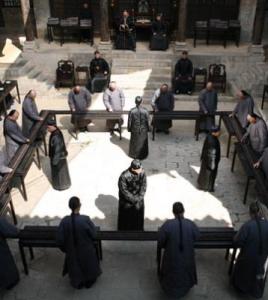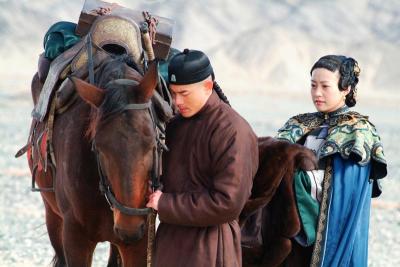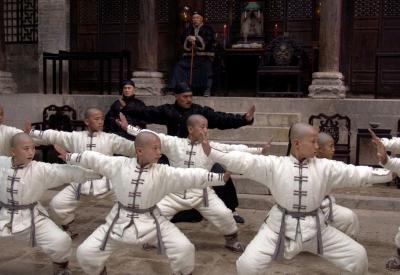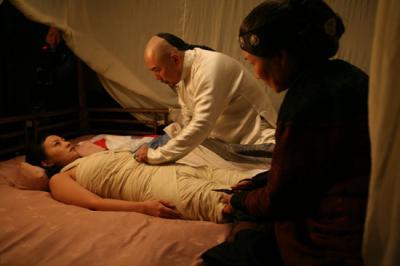By: debbie lynn elias

What a fascinating film! Historical (in fact, rooted in the history of writer/director Christina Yao’s own family), interesting and beautiful, EMPIRE OF SILVER shines in every respect.
Set in China at the end of the 19th Century, the Shanxi merchant organization is led by Lord Kang. The merchant organization was actually the form of banking in the day with silver being the “gold standard” and method of payment and the merchants trying to hoard same. We meet Lord Kang at a critical time as he must choose his successor from one of his four sons. First Master, follows the Buddhist way of life and is out of the running to lead the organization. Second Master seems a logical choice, although he has a bit of an anger management issue. Third Master is a complete goofball, screw-up and will never live up to his father’s expectations. Fourth Master, the youngest son, only wants to follow his heart and marry the love of his life, something for which his father gives his blessing.

Unfortunately, circumstances and events occur that leave Lord Kang only one successor – Third Master. He doesn’t want the job and Dad doesn’t want him to have the job, but under the laws of succession, Third Master must take the job. But strange things often happen when someone is thrust into situations for which they are unprepared; they buckle down, learn and thrive. And while Third Master does just that, it’s not an easy road as his business ethics differ from his father and the other merchants, and his heart pines for the love of his life who just happens to now be his stepmother.
As the British and Americans become a more prominent part of the culture and business, war, political turmoil and upheaval take their toll on Third Master and the Shanxi merchants as paper money begins to replace silver, changing their entire way of life. Can Third Master move forward with the times or will he succumb to the mandates of his father and others and what will become of his heart in the process?

EMPIRE OF SILVER is a great history lesson, not only about imperialist China but also about business, mixed in with familial succession and treachery as compelling storytelling tools giving rise to interesting characters and twists and turns. The dynamic and personalities of the four brothers – First, Second, Third and Fourth is so preciously portrayed and detailed. Likewise, the history of the Shanxi merchants’ Piaohao and the entire financial structure under the rule of Lord Kang. Not surprising is that the goofball son turns out to be the best of the bunch in the story. Such an epic story and epic undertaking for any director, let alone a first time director like Christina Yao.

The costuming is outstanding in terms of authenticity and establishing the time, the class system. Yao was so intent on authenticity, that she obtained antique fabrics, jewelry, buttons, hasps, etc. which were all implemented in costume construction. The authenticity is impeccable. And then you look at the locations. Yao was given access to shoot at the at the 500 year old Ming building, one of only two surviving buildings in China to have used gold flakes in the surface paint, something Yao learned when she wanted to power-wash the building to remove the dust and grime of the centuries. Luckily, she was stopped before destroying history. Lensing was also done at the famed Yuan Dynasty bridge which is still in use today. Fueling the authenticity of history is the excellence of the cinematography which really showcases these artifacts and historical locations while simultaneously giving us an intimacy with each of the characters.

The underlying thematic of the film in terms of finding one’s self, making choices, crisis of conscience are all very powerfully told not only with the dialogue but through the visuals. The performances are exemplary and through the body language alone, complimented with costuming, speaks volumes as to each character and the story.
A token English speaking role in the film goes to Jennifer Tilly as the missionary wife, Mrs. Landdeck. Such an understated performance and persona. A pivotal role as it propels the story forward in terms of the female perspective, I would, however, have liked to see Tilly’s role expanded. Unfamiliar with the Asian actors, this was an eye opening experience for me. Aaron Kwok is amazing as Third Master. I would love to see him cross-over into American films. He goes from almost screwball comedy moves to strength, seriousness, compassion, command. A beautiful character arc that is exquisite to watch unfold. Similarly, the chemistry between Kwok and Tielin Zhang’s Lord Kang which is so telling and so believable as father-son/master-apprentice. And Zhang – a portrait of tacit power. Enchanting was Hao Lei as Madame Kang. Delicate, strong, tender, defiant. She brought the full spectrum of emotion to the table and artfully manipulates the audience with each one. I have to say, I loved the treachery and “evil” that Hei Zi brought to Second Master. Balancing that is the tacit uncertainty and strength from Shi Da Sheng as First Master.

And talk about the score by Su Cong, Seikou Nagaoka and Lin Hai. Not only beautiful, but so telling of the time, the people and the story.
EMPIRE OF SILVER – a truly exemplary and beautiful, film.
Aaron Kwok – Third Master
Tielin Zhang – Lord kang
Hao Lei – Madame Kang
Jennifer Tilly – Mrs. Landdeck
Hei Zi – Second Master
Si Da Sheng – First Master
Written and Directed by Christina Yao.












